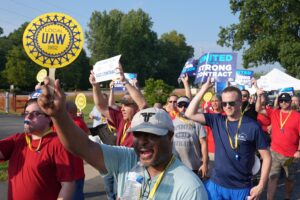Produced and edited by Libby Rainey and Ian McKennna
California farmworkers are often forced to work through dangerous wildfires even as residents flee. They’re calling for urgent protections like disaster insurance and hazard pay as fire season rapidly approaches. We spoke to workers about their demands. Below is a full transcript of our video. Many of the interviews have been translated from Spanish into English.
In the past 6 years, California’s wine country has had 23 major fires that burned nearly 1.5 million acres, an area larger than Rhode Island. While others flee, farmworkers have often been forced to stay and work in the fields.
Margarita Garcia, Sonoma County farmworker: Is it worth it to go out and harvest? Is it worth it to leave your family? There are times when we have to reflect on that. But at the same time you’re thinking, “What are we going to eat? How are we going to survive?”
Isidro Rodriguez: Yes, I’ve felt pressured to work during the wildfires because I didn’t really have another option.
Rally Speaker: Every time we would pick the grapes, we would shake free the ashes from the fire.
Margarita: They’re out there risking their lives, their health, neglecting their families, and making the vineyard owner their priority. And in the end, they aren’t even given what they deserve.
Farmworkers in Sonoma County are organizing for basic protections ahead of this year’s fire season. They want the Sonoma County Board of Supervisors to take action by June 1. Fire season in California is rapidly approaching, and scientists say the blazes this year could be the worst ever.
Davin Cardenas: We have five demands, what we call the Five for Farmworkers. One of those being the demand for hazard pay. Secondly if a worker chooses not to work or cannot work due to smoke or fire or crop lost, we feel they should be compensated for their lost wages. The harvest is a key moment for a workers’ economic livelihood for their families, and to not be able to work is devastating. The third demand is around language justice. Any instructions given to workers in an evacuation zone, in a time of fire, be translated not only from English to Spanish, but also to the indigenous languages that are spoken in Sonoma county. The fourth is around clean water and clean bathrooms. The fifth is about community safety observers. These are people that we’re organizing to actually go and observe the fields, make sure that workers are protected, make sure that safety standards are up to par.
Even in evacuation zones, farmworkers say they feel the economic pressure to continue working.
Margarita: we don’t have the luxury of saying, “Today, I’m not gonna work.” Or, “This week, I won’t work because of the fire.” Or because we have to stay with our family. Work is an obligation. Even in an area that’s been evacuated, they’ll let us in. The police will let us in, you just say, “We’re here for the harvest.” Even if it’s an area that we really shouldn’t be in.
Farmworkers also bear the economic brunt when conditions are too dangerous to work or if the crops are destroyed
Isidro: The vineyard owners don’t really lose that much because they have their grapes—the product—insured. Farmworkers do suffer a lot because we’re out of work for many days. And that’s a huge problem for all of us farmworkers.
Rally Speaker: During the wildfires, they just cancelled a bunch of our workdays. But we don’t make enough to be able to take those days and keep paying for our expenses.
Isidro: Having disaster insurance, including for things like fire or whatever else might happen, the difference would make would be huge. I wouldn’t have to be so worried. So if I couldn’t work for 3 or 4 days because of the smoke from the wildfires, I would be a lot calmer knowing that I’d have some way of recouping the time and money that we’re losing.
Rally Speaker: I believe that language justice, disaster insurance, and hazard pay are human rights.
Margarita: If we can make this happen, it would be a huge win for not just me and my family—but for all workers.
Isidro: We go to work and risk our lives every day—wildfire or no wildfire we are always putting our lives on the line. Pesticides, all of that stuff they put in the vineyards, we work through all of it. And that’s why I tell my colleagues to support this campaign.


